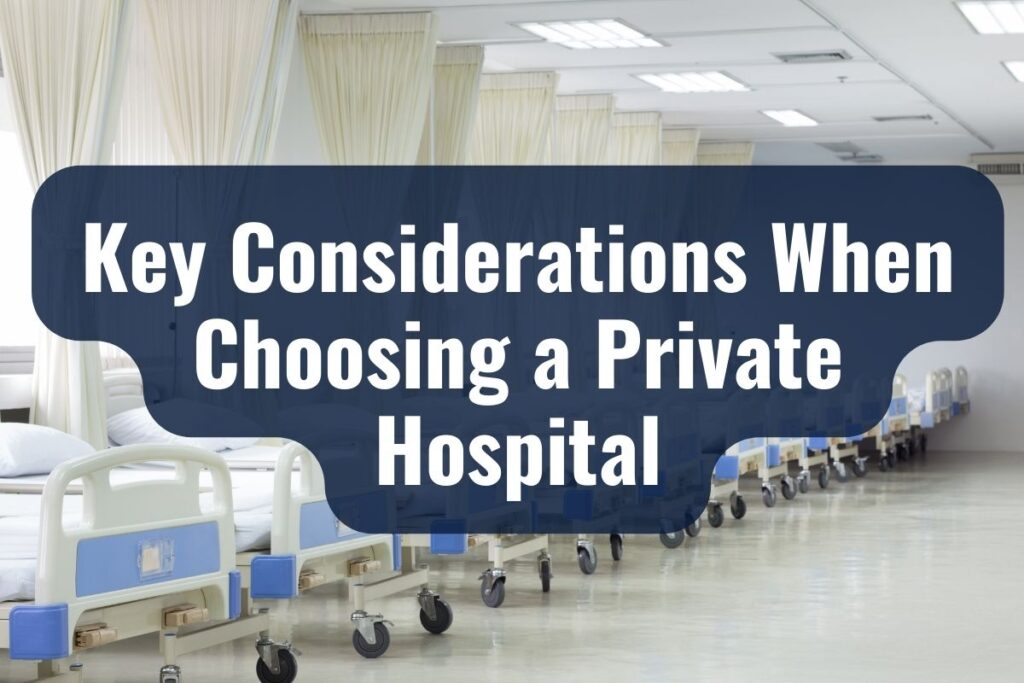Thailand, a stunning blend of ancient traditions and modern advancements, offers more than just its picturesque landscapes and vibrant culture. One significant aspect, often understated, is its robust healthcare system.
As the world becomes more interconnected and more foreigners choose Thailand as their second home or a frequent travel destination, understanding the intricacies of its medical framework becomes paramount.
In this guide, we’ll dive deep into the realm of private hospitals in Thailand, offering insights that will equip you with the knowledge to navigate this critical sector with ease.
KEY TAKEAWAYS
- Thailand’s private hospitals offer top-tier care, especially beneficial for foreigners.
- Language-friendly services in private hospitals ensure smooth communication for expatriates.
- International accreditations highlight a commitment to global healthcare standards.
- Costs in private hospitals can be higher compared to public facilities.
- Being informed and proactive can assist in getting the most out of the private hospital experience.
The Landscape of Private Hospitals in Thailand
Thailand’s rapid economic development over the past few decades has played a pivotal role in the establishment and expansion of private healthcare institutions. Not only has this nation risen as a popular travel destination, but it’s also emerged as a sought-after hub for medical tourism.
Private hospitals in Thailand are predominantly located in major cities and tourist hotspots. Bangkok, the capital, boasts a significant concentration of these hospitals, followed by other urban areas like Chiang Mai, Phuket, and Pattaya. These establishments cater to a broad spectrum of needs, from general health concerns to specialized medical procedures.
Several of these hospitals have carved a niche in specific medical domains. For instance, some are renowned for their state-of-the-art cardiac units, while others are sought after for their advanced orthopedic departments. This specialization has been a driving force in attracting both locals and foreigners in search of the best care.
Moreover, the private hospital sector in Thailand collaborates extensively with international medical institutions, ensuring a consistent update in techniques, technologies, and treatment protocols. This commitment to excellence is evident in the high standard of care, the modern infrastructure, and the globally recognized accreditations many of these hospitals hold.
However, while the urban regions of Thailand have a dense distribution of private hospitals, it’s crucial to note that the more remote or less developed areas might not have as easy access to them. For those residing or traveling in such regions, a trip to the nearest city might be necessary for specialized treatments.
Benefits of Choosing Private Hospitals

Private hospitals in Thailand are often the preferred choice for many, especially foreigners. Their appeal goes beyond just the polished exteriors and modern facilities. Here, we delve into the distinct advantages that make private hospitals stand out.
Quality of Care
Thailand’s private hospitals pride themselves on delivering top-tier medical services. With state-of-the-art equipment, cutting-edge technology, and continuous training programs, these hospitals ensure that patients receive the best possible care. The emphasis on maintaining high standards translates to better diagnostics, treatment precision, and overall patient satisfaction.
English-speaking Staff
One of the most significant barriers a foreigner can face in a new country is the language barrier. Private hospitals in Thailand address this challenge by employing English-speaking staff, particularly in roles that demand patient interaction. This feature ensures smoother communication, reducing the potential for misunderstandings and enhancing the overall patient experience.
International Standards Compliance
Several private hospitals in Thailand are accredited by international bodies, a testament to their commitment to global standards of healthcare. Organizations such as the Joint Commission International (JCI) assess and certify hospitals based on stringent criteria, ensuring that patients receive care comparable to leading institutions worldwide.
Tailored Services for Expatriates
Recognizing the unique needs of the international community, many private hospitals have crafted services specifically for expatriates. These could range from specialized medical packages to dedicated international patient departments. The idea is to provide a seamless healthcare journey for foreigners, with added comforts and conveniences that cater to their specific requirements.
Potential Drawbacks of Private Hospitals
While private hospitals in Thailand offer numerous benefits, it’s crucial for patients, especially foreigners, to be aware of potential downsides. Being informed can lead to better decision-making and set realistic expectations when seeking medical care.
Cost
The top-of-the-line facilities and services provided by private hospitals often come with a higher price tag compared to public hospitals. While the quality of care is exceptional, treatments, consultations, and even routine check-ups might be considerably more expensive. This can be a significant concern for those without comprehensive health insurance or those on a limited budget.
Over-treatment
With the profit-driven nature of some private establishments, there’s a potential risk of over-treatment. Patients might find themselves recommended for additional tests, procedures, or treatments that might not be strictly necessary. While this isn’t a universal issue, it’s essential to be vigilant and seek second opinions if in doubt.
Limited Local Insight
Given that many private hospitals cater extensively to foreigners, there’s a possibility that they might be more aligned with international treatment protocols, potentially overlooking local health issues or indigenous treatment methods. While the international approach ensures high standards, it might miss out on some local nuances.
Increased Waiting Time
Due to their popularity, especially among tourists and expatriates, private hospitals can sometimes experience longer waiting times. Whether it’s for consultations, treatments, or surgeries, the demand can lead to delays, which might be inconvenient or stressful for patients.
Key Considerations When Choosing a Private Hospital

Selecting the right private hospital in Thailand is a decision that should be made with care and diligence. Given the plethora of options and the varied needs of individuals, here are some essential factors to consider to ensure you make an informed choice.
| Consideration | Description |
| Insurance Coverage | Verify if the hospital accepts your health insurance to avoid unexpected costs. |
| Hospital’s Reputation | Research reviews, testimonials, and feedback for insights on care quality. |
| Specialized Departments | Ensure availability of departments or specialists for specific medical needs. |
| Proximity | Choose a hospital close to your residence or place of stay for convenience, especially in emergencies. |
| Language Assistance | Confirm the availability of English-speaking staff or interpreters for other languages. |
| Accreditation and Affiliations | Check for international healthcare accreditations and affiliations for assurance of global standards. |
| Cost Transparency | Understand the hospital’s cost structure for better budgeting and financial planning. |
Insurance Coverage
Before settling on a hospital, it’s paramount to verify if it accepts your health insurance. While many private hospitals in Thailand cater to international insurance providers, it’s always wise to confirm beforehand to avoid unexpected out-of-pocket expenses.
Hospital’s Reputation
Researching the hospital’s reputation can provide valuable insights. Look for reviews, testimonials, and feedback from previous patients. Word-of-mouth recommendations from friends or acquaintances can also offer a genuine perspective on the quality of care and overall experience.
Specialized Departments
If you have a specific medical concern, it’s essential to ensure the hospital has a department or specialists catering to that area. Whether it’s cardiology, orthopedics, or maternity care, the availability of specialized departments can make a significant difference in the quality and efficiency of treatment.
Proximity
Consider the hospital’s location in relation to your residence or place of stay. In emergencies, proximity can be a critical factor. Even for routine visits or treatments, a hospital that’s conveniently located can save time and reduce logistical hassles.
Language Assistance
While many private hospitals have English-speaking staff, it’s beneficial to check if they offer interpreters or dedicated assistance for other languages you might be comfortable with.
Accreditation and Affiliations
Check if the hospital is accredited by international healthcare bodies like the Joint Commission International (JCI). Such accreditations are indicative of the hospital’s commitment to global standards. Additionally, affiliations with international medical institutions can signify collaborative efforts in adopting best practices.
Cost Transparency
Understanding the cost structure can prevent surprises in billing. Some hospitals offer package deals or transparent pricing for various treatments. This clarity can assist in budgeting and financial planning.
Related: Cost of Living in Thailand: An Essential 2024 Guide
Navigating the private hospital environment in Thailand, especially as a foreigner, can be a unique experience. To ensure a smooth and stress-free journey, here are some practical tips to consider:
Making Appointments
Advance Planning: Whenever possible, schedule your appointments in advance. This ensures you get your preferred time slots and reduces waiting times.
Documentation: Carry all relevant medical records, prescriptions, and previous test results to provide a clear medical history to the attending physician.
Understanding Bills and Payments
Itemized Bills: Always request an itemized bill to understand the breakdown of charges. This helps in ensuring you’re only billed for services availed.
Payment Methods: Confirm the accepted payment methods in advance. While most hospitals accept credit cards and international bank cards, it’s good to be prepared.
Seeking a Second Opinion
Stay Informed: If a diagnosis or treatment plan seems uncertain or overly aggressive, don’t hesitate to seek a second opinion. This ensures you’re making well-informed decisions about your health.
Utilize Hospital Networks: Many private hospitals in Thailand are part of larger chains or networks. Leveraging these can make it easier to obtain a second opinion within the same system.
Communication is Key
Clear Queries: When discussing medical concerns with the staff or doctors, be clear and specific in your queries. If language is a barrier, consider using translation apps or seeking the assistance of bilingual staff.
Feedback Channels: If you have suggestions or concerns about your experience, utilize the hospital’s feedback channels. Many institutions value patient feedback and actively work on improving their services.
Stay Updated on Policies
Visitor Policies: Understand the hospital’s policies on visitors, especially in the current context of health protocols and restrictions.
Discharge Procedures: Familiarize yourself with the discharge process, including any necessary paperwork and post-care instructions.
Prepare for the Unexpected
Emergency Protocols: Know the hospital’s emergency procedures and contact numbers. Having this information handy can be crucial in urgent situations.
Medication Availability: Some medications might have different brand names in Thailand. If you have specific prescriptions, inquire in advance about their availability or possible alternatives.
Related: Emergency Numbers in Thailand: What You Need To Know


